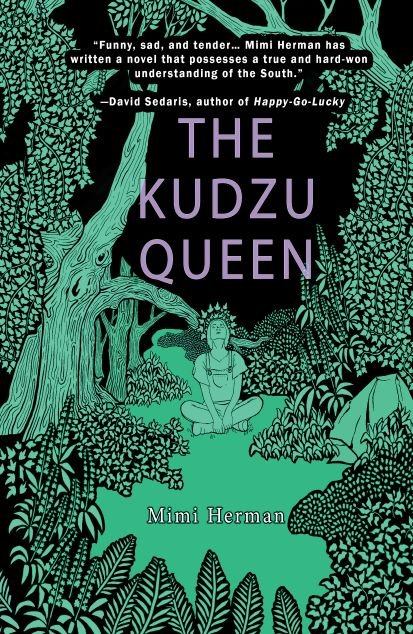The Kudzu Queen by Mimi Herman
I love a novel that teaches me something. It can be something about myself or life but also about a historical moment or an ecological oddity. There’s something powerful about learning through fiction. The way it sticks to you by attaching itself to the narrative. Mimi Herman manages this with alacrity in her excellent coming-of-age novel, The Kudzu Queen.
I had never heard of kudzu before reading this book. I'd have believed you if you had told me it was a mythical monster or a chemical compound manufactured by J & J. It isn’t either of those things. It’s a plant. A vine that consumes all life around it. It blocks out the sunlight and kills the plants underneath it. It’s incredibly resilient and is classified in the United States as an invasive species.
It can also be eaten or used in various forms of folk medicine or woven into baskets or, well, any number of other uses.
During the Dust Bowl, the Soil Conservation Service paid farmers eight dollars per acre to plant kudzu on their land to stave off the erosion that caused the Dust Bowl. The Dust Bowl, of course, coincided with The Great Depression, and eight dollars per acre was an offer few could pass up.
Naturally, people capitalized on this opportunity. Men traveled the south, promoting the crop and encouraging people to plant it. Think of The Music Man (or the Phil Hartman voiced Lyle Lanely in The Simpsons episode Marge vs. the Monorail) but with a noxious weed instead of a band.
That’s the background for this novel, though you didn’t need me to tell you all that, as Herman manages to detail it in the book (and honestly does a much better job of it). She weaves in the history and context with the careful ease that so much excellent historical fiction manages. After you finish the novel, you’re left with many thoughts about kudzu and the nation. What are the consequences of short-term thinking? When is the solution worse than the problem? How does this novel reflect on our current ecological disasters? And how does the kudzu represent capitalism and the increasingly unachievable American dream?
That’s one of my favorite things about good historical fiction. They use the past to reflect on the present without making it obvious. Herman manages that with a deft touch. You never feel like you’re being preached to or like she’s trying to teach you a lesson. She uses a coming-of-age story to package these macro ideas without sacrificing the heart of the novel – our teenage protagonist.
Mattie, our precocious and charming narrator, is on the cusp of adulthood, an age that lends itself well to a novel about change. She’s straddling multiple worlds, sometimes forced to act as an adult and other times slipping seamlessly into the comfort of childhood. Herman dances between these two worlds with elegance and beauty.
I was particularly taken by the way she demonstrates Mattie’s feelings towards the Kudzu King – the music man who comes to town to sell them kudzu. She begins the novel being enamored with him. She longs for something… to do something with him, though she’s not quite sure what. It’s not that she’s unaware of what adults do, but she doesn’t know how far she wants to go. I won’t spoil anything, but her emotions regarding him and her pending adulthood change throughout the novel.
This relationship works on a metaphorical level as well. The Kudzu King represents a seedy version of capitalism that still festers in our nation. She’s drawn to it - the wealth, the charm, the vibrancy - and longs to be a part of it. But she discovers the squalid underbelly of this form of capitalism – how a man like the Kudzu King uses and exploits innocent, trusting people.
The Kudzu Queen possesses beautiful moments of compassion and humanity. It shows the effect that poverty and neglect can have on children and how love can be found even in the darkest times. It’s a beautiful novel that illuminates a time and place in our nation and speaks to something universal in all of us. I can’t recommend it highly enough. It’s a vivid portrait of the South during The Great Depression, and more than that, it’s a timeless story of growing up in the face of adversity.
